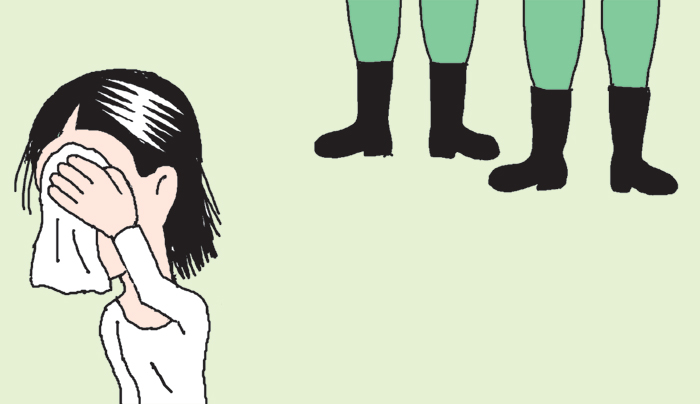“This was a serious human rights violation that should never have happened and should never be repeated,” Judge Jeon Ji-won, speaking for the panel, said of the detention and forced treatment.
Judge Jeon said the prostitutes had been “comfort women for the United States military,” touching on one of the country’s most delicate historical issues by using the same euphemism for prostitutes the Japanese have applied to Korean and other women who were forced into sexual servitude by its soldiers during World War II.
The plaintiffs had encouraged that comparison, arguing that it was hypocritical for South Korea to condemn Japan for its historical wrongdoings while not acknowledging its own role in ensuring that foreign soldiers had access to Korean prostitutes.
“They say we walked into gijichon on our own, but we were cheated by job-placement agencies and were held in debt to pimps,” Park Young-ja, 62, one of the plaintiffs, said after the ruling on Friday. “I was only a teenager and I had to receive at least five G.I.s every day with no day off. When I ran away, they caught and beat me, raising my debt.”
She added, “There was no one speaking for us, and we were abandoned by the state.”
The Justice Ministry, which represented the government in the lawsuit, did not immediately react to the ruling on Friday.
In the destitute years after the Korean War of 1950-53, the dollars that prostitutes in the camp towns earned were a valued source of hard currency in South Korea. Former prostitutes have testified that government officials had urged them to earn more, calling them “patriots.”
At the same time, the women said, the health authorities cracked down on prostitutes who tested positive for sexually transmitted diseases, less out of concern for the women than to protect American soldiers. Newspaper accounts and parliamentary documents from the time referred to the prostitutes as “comfort women.” The court said on Friday that some of the women had been sold into the camps through human trafficking, while others appeared to have chosen prostitution to make a living.
Scholars who have studied the issue have said that the South Korean government was motivated in part by fear that the American military, stationed in the country to provide a defense against North Korea, would leave.
The American military became involved in attempts to regulate the sex trade to minimize the spread of disease among soldiers, those scholars said. The United States military command in Seoul has said that it did not condone or support prostitution or human trafficking.
The South Korean government has never formally acknowledged involvement in the camp towns or taken responsibility for abuses there. The women kept quiet for decades, partly because the military governments that ruled South Korea until the late 1980s enforced silence about issues that could be seen as detrimental to the alliance with the United States.
In addition, South Korean society has an extremely negative view of prostitutes, especially ones who had been paid by foreign soldiers. Prostitution is and has always been illegal in South Korea.
In 2014, however, more than 120 former prostitutes filed a lawsuit demanding compensation and a government apology for their detention and forced treatment. only 57 of the plaintiffs were awarded compensation on Friday, because the court said there was not enough evidence that the others had been detained illegally.
Kim Jin, a lawyer for the women, said the verdict on Friday was significant because it was the first official acknowledgment that women in the camp towns had been subjected to illegal treatment. But Ms. Kim said the women would appeal the ruling, seeking an official apology, greater compensation and a finding that the government was responsible for creating and running the camp towns.
“We are not doing this for a mere 5 million won,” a woman who declined to give her name shouted outside the courtroom, referring to the compensation in South Korean currency each woman would receive. “They told us to earn as many dollars as possible, and now they want us to keep our mouths shut.”
Shin Young-sook, an advocate for the women, welcomed the court’s use of the term “comfort women” to refer to the former prostitutes.
For decades, bars and brothels have lined the streets of neighborhoods around American bases in the country. But the former prostitutes involved in the lawsuit said that few of their fellow citizens knew how deeply their government had been involved in the sex trade in the camp towns in the past.
They say the government not only sponsored classes for them to learn basic English and etiquette, meant to help them sell themselves more effectively, but that the American military police and South Korean officials also regularly raided clubs looking for women who were thought to be spreading diseases.
They added that the police would then detain those women, locking them up in so-called monkey houses with barred windows. There, they said, the women were forced to take medications until they were well.
“They never sent us doctors even when we were so sick we almost died, except they treated us for venereal diseases,” Ms. Park said. “It’s clear that they treated our venereal diseases not for us but for the American soldiers.”

